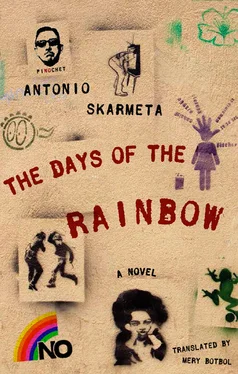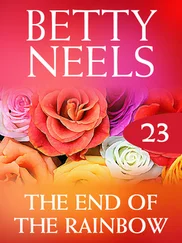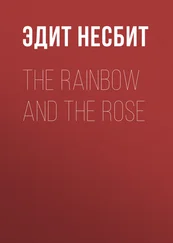“A great future, my friend,” Bettini repeated.
He gestured Magdalena to go to the balcony and take a look at the car.
He covered the mouthpiece of the phone and whispered to her, “Go and buy something at the grocery store and take a good look at the driver’s face.”
“Don Adrián, do you think that we’re going to win the plebiscite?”
“The plebiscite, sure,” Bettini said, blowing a kiss at his wife. “But I don’t know if they’ll accept the outcome.”
“They have no option, Don Adrián. The foreign press is here, and the reporters told me that they’re going to stay until election day.”
The driver’s companion was now looking at Magdalena, who was crossing the street on her way to the grocery store. He put his finger just below his eye, signaling the other to pay attention.
“Tell me something, Mr. Alarcón …”
“At your service, Don Adrián.”
“By any chance, do you have a friend with a small house outside Santiago? In the countryside, or on the coast?”
“Sure. Fernández, in Papudo. Why?”
“Well, the weather is so nice and I’ve seen you looking a little pale. Why don’t you go to the beach for a few days, to sunbathe and rest?”
There was a long silence on the other end of the line. Then Alarcón cleared his throat and asked, “Is there anything wrong, Mr. Bettini?”
“No, nothing. Nothing.”
“Excuse me for asking, but … are you afraid?”
“No, my friend, no,” Bettini answered, while looking for the number of the Italian consul in his address book.
“Because, as for me, I can say that …”
“Shit scared?”
“Well … not as much as shit shit-scared, but … close. I’m sorry, Don Adrián. I didn’t want to bother you. It was only to thank you … for having believed in me …”
Bettini smiled bitterly. He didn’t tell him what he really had to tell him: “I didn’t believe in you. I doubted you all along. Until last night, I was sure that you were a complete fool.”
“Bravo for your waltz, Little Flower.”
“I did nothing, Don Adrián. Strauss is the great one.”
“Take care. Is everything okay at your place?”
“Everything’s perfect. You know … People love me.”
“Much deserved.”
Bettini hung up and called the Italian embassy at once.
Little Kinky Flower hung up and looked again, worried, at the black car parked a little farther down the street, near the square.

A FEW DAYS BEFOREthe elections, sociologists published the results of their polls.
Sixty-five percent of the undecided had now decided to vote No .
This, added to the great majority that would vote No regardless, the poll numbers assured that the option against Pinochet would win the plebiscite.
The team commanded by the minister of the interior didn’t show any reaction or flexibility in the face of the new wave of popularity that the No was riding. They appeared on numerous TV programs, benefiting from the government’s TV monopoly, and they never tried to address the undecided — only their own most fervent supporters.
Pinochet continued to trust Minister Fernández and his advisers, who presented him only the polls that looked favorable. The No campaign was harmless, and sociologists, who were giving the victory to your enemies, my general, are a gang of laid-off delinquents.
One of those laid-off delinquents had written, “The gods blind those whom they wish to destroy.”
At Bettini’s house, everybody’s spirits had been lifted almost as much as in every Chilean province. In a country where the main entertainment was TV, the emergence of the No in the media lessened the loneliness that was haunting the lives of every person or family. The long-standing hopelessness was somewhat softened.
For the first time, sociologists explained to Bettini, people were feeling that TV was talking to them instead of ignoring them. Those fifteen minutes were a big bang of stellar images that didn’t vanish immediately after the transmission. They kept on producing new constellations, new bursts of energy everywhere. The grave grimace had relaxed; the bitter expression on their faces had given way to smiles.
Up to that moment, what wasn’t shown on the screen didn’t seem real. People felt that the fictitious, banal characters on the TV shows were more real than themselves. They had only silence. They didn’t have authorization to live, only to witness the lives of those unreal beings they watched every night.
That brushstroke of democracy that Pinochet had allowed had broken the dam. The strategy that seemed a harmless little game had sparked the longing for a future and happiness. Slowly, Bettini was starting to believe it, too. But his success was becoming more and more dangerous. From American films, he had inherited a word that he used only when he was among trusted friends— fucking . Now he was able to talk about his fucking success with a half smile. The days before the elections he barely slept at all. There was an excess of adrenaline around him, which didn’t allow him a single moment of calm.
There were rumors that the military, aware that the eventual outcome might not favor Pinochet, were going to send all this democratic comedy to hell and not announce the results of the plebiscite. Others said that they were going to fabricate acts of terrorism to have an excuse to suspend the elections.
The parties favoring the No called on voters to choose No without hatred, violence, or fear.
On October 5, Bettini arrived at his polling station, near Egaña Square, accompanied by Magdalena and Patricia. He stood in line under a cheerful sun, buying, every once in a while, a few small bottles of mineral water from the street vendors. As he was approaching his voting table, his heart began to pump faster. That apparent routine made him feel happy. He had imagined everything more solemn and complex. But it wasn’t. There he was. One among hundreds in his Ñuñoa. One among hundreds of thousands in Santiago. One among millions in Chile. Where might Little Kinky Flower be voting? Bettini was as thankful for his anonymity as the singer was happy with his popular acclaim.
If the No won, he vowed he wouldn’t ask anything else from life. Maybe to rent a house on the beach, to take his favorite cassettes, his Greek history books. (Hmm! “The gods blind those whom they wish to destroy.”)
If the No won …
Actually, he couldn’t conceive a future beyond the No . It felt weird to think that this was only one step on the way to something bigger. This insignificance, his rainbow, his handful of images, Alarcón’s waltz, deep down, they were … everything.
The crowning moment of his life.
Let others worry about the future. He — he raised a fist and kept it in the air when an acquaintance greeted him from the other side of the line — wanted only to enjoy the present. The eternity of this precise moment.
We only need for the No to win.
——
AT MIDNIGHT, he leaned out of the window just before the secretary of the interior made the results known. The commanders of the armed forces had gauged the country’s climate and it was too late for them to ignore or falsify the votes.
“There are already so many people celebrating in the streets that it would be an atrocity to start shooting,” the minister of the interior reported to the palace.
Undersecretary Cardemil announced that the No had won fifty-three percent of the votes.
Читать дальше












